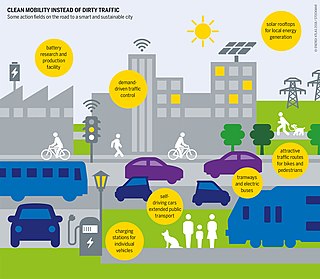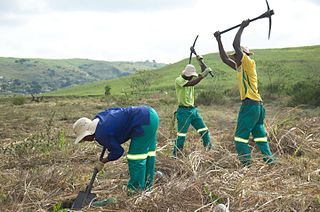
The United Nations Environment Programme (UNEP) is responsible for coordinating responses to environmental issues within the United Nations system. It was established by Maurice Strong, its first director, after the United Nations Conference on the Human Environment in Stockholm in June 1972. Its mandate is to provide leadership, deliver science and develop solutions on a wide range of issues, including climate change, the management of marine and terrestrial ecosystems, and green economic development. The organization also develops international environmental agreements; publishes and promotes environmental science and helps national governments achieve environmental targets.

The International Union for Conservation of Nature (IUCN) is an international organization working in the field of nature conservation and sustainable use of natural resources. Founded in 1948, IUCN has become the global authority on the status of the natural world and the measures needed to safeguard it. It is involved in data gathering and analysis, research, field projects, advocacy, and education. IUCN's mission is to "influence, encourage and assist societies throughout the world to conserve nature and to ensure that any use of natural resources is equitable and ecologically sustainable".

Sustainable transport is transportation sustainable in terms of their social and environmental impacts. Components for evaluating sustainability include the particular vehicles used for road, water or air transport; the source of energy; and the infrastructure used to accommodate the transport. Transport operations and logistics as well as transit-oriented development are also involved in evaluation. Transportation sustainability is largely being measured by transportation system effectiveness and efficiency as well as the environmental and climate impacts of the system. Transport systems have significant impacts on the environment, accounting for between 20% and 25% of world energy consumption and carbon dioxide emissions. The majority of the emissions, almost 97%, came from direct burning of fossil fuels. In 2019, about 95% of the fuel came from fossil sources. The main source of greenhouse gas emissions in the European Union is transportation. In 2019 it contributes to about 31% of global emissions and 24% of emissions in the EU. In addition, up to the COVID-19 pandemic, emissions have only increased in this one sector. Greenhouse gas emissions from transport are increasing at a faster rate than any other energy using sector. Road transport is also a major contributor to local air pollution and smog.

The French Development Agency, known from 1992 to 1998 as the Caisse Française de Développement, is a public financial institution that implements France's development and international solidarity policies. It works to fight poverty and promote sustainable development. It is active in Africa, Asia, the Middle East, Latin America, the Caribbean, and the French overseas territories, where it finances and supports projects that improve living conditions for populations, promote economic growth and protect the planet.

The Indian Ocean Commission is an intergovernmental organisation that links African Indian Ocean nations: Comoros, Madagascar, Mauritius, Réunion, and Seychelles. There are also seven observers: China, the European Union, the Organisation internationale de la Francophonie, the Sovereign Order of Malta, India, Japan and the United Nations.

The International Institute for Applied Systems Analysis (IIASA) is an independent International research institute located in Laxenburg, near Vienna in Austria, founded as an East-West scientific cooperation initiative during the Cold War. Through its research programs and initiatives, the institute conducts policy-oriented interdisciplinary research into issues too large or complex to be solved by a single country or academic discipline. These include climate change, energy security, population aging, and sustainable development. The results of IIASA research and the expertise of its researchers are made available to policymakers worldwide to help them make informed and evidence-based policies.

ICLEI – Local Governments for Sustainability is an international non-governmental organization that promotes sustainable development. ICLEI provides technical consulting to local governments to identify and meet sustainability objectives. It has a strong focus on biodiversity and has worked across local, national, and global levels. ICLEI was the first and is the largest transnational network of local governments engaging in climate action.

The Gendarmerie Nationale is the national gendarmerie of Niger. The Gendarmerie Nationale are under the Niger Armed Forces and report to the Ministry of Defense. They are responsible for law enforcement in rural areas. Niger's civilian police force, the National Police, is a separate agency under the Ministry of Interior, Public Safety and Decentralization, and are responsible for policing in urban areas.

SYSTRA is a multinational engineering and consulting group in the mobility sector, whose fields of activity include rail and public transport. SYSTRA employs about 10,300 people worldwide, and is a limited company which shareholders include French national railway company SNCF, RATP, and various banks.
The Kandadji Dam, is a large multipurpose dam under construction on the Niger River. The site is situated near the small town of Kandadji, Tillabéri Department, Tillabéri Region, Niger, 180 km northwest of the capital Niamey. It is being built by the Haut Commissariat à l'Aménagement de la Vallée du Niger, a public body under the Primer Minister's Office.
The GLOBAL ENVIRONMENTAL INSTITUTE (GEI) was founded in the U.S. in 2003 and was registered as an independent non-profit organization in the State of Delaware. GEI's mission was to design and implement market-based models for solving environmental problems in order to achieve development that is economically, ecologically, and socially sustainable. GEI was dissolved in October 2011. GEI's sister organization, the independent Beijing Chaoyang District Sustainable Global Environmental Institute in China (GEI-China) remains active.
Environmental governance (EG) consists of a system of laws, norms, rules, policies and practices that dictate how the board members of an environment related regulatory body should manage and oversee the affairs of any environment related regulatory body which is responsible for ensuring sustainability (sustainable development) and manage all human activities—political, social and economic. Environmental governance includes government, business and civil society, and emphasizes whole system management. To capture this diverse range of elements, environmental governance often employs alternative systems of governance, for example watershed-based management.
The Prince Albert II Foundation is a Monaco-based charity which has donated millions in various environmental projects. The foundation was initially created in 2006 by Prince Albert II of Monaco and it concentrates on environmental protection, sustainable development, climate change and the promotion of renewable energies as well as biodiversity. The foundation supports also projects which develop water resource management or desertification control technologies.

Rajendra Madhavrao Shende

Friends of the Earth – France is an association for the protection of people and the environment. It is one of 76 national groups around the world which make up the Friends of the Earth network of environmental organizations. The group is listed as an association under the French law of 1901 (Loi de 1901) and authorised to act for the protection of the environment in France by order of the Environment Minister. Friends of the Earth – France is independent of any economic, political and religious influences.
Natural capital accounting is the process of calculating the total stocks and flows of natural resources and services in a given ecosystem or region. Accounting for such goods may occur in physical or monetary terms. This process can subsequently inform government, corporate and consumer decision making as each relates to the use or consumption of natural resources and land, and sustainable behaviour.
The South African National Biodiversity Institute (SANBI) is an organisation tasked with research and dissemination of information on biodiversity, and legally mandated to contribute to the management of the country's biodiversity resources.

The Buffelsdraai Community Reforestation Project was initiated in 2008 to alleviate climate change impacts associated with hosting elements of the 2010 FIFA World Cup in Durban. The proposed carbon offset was to be achieved through the planting of more than 500 000 indigenous trees within the buffer zone of the Buffelsdraai Landfill Site. Restoring the forest ecosystem was identified as a way of "absorbing event-related greenhouse gas emissions while enhancing the capacity of people and biodiversity to adapt to the inevitable effects of climate change".
Mariama Mamane is an environmentalist and engineer from Niger.













